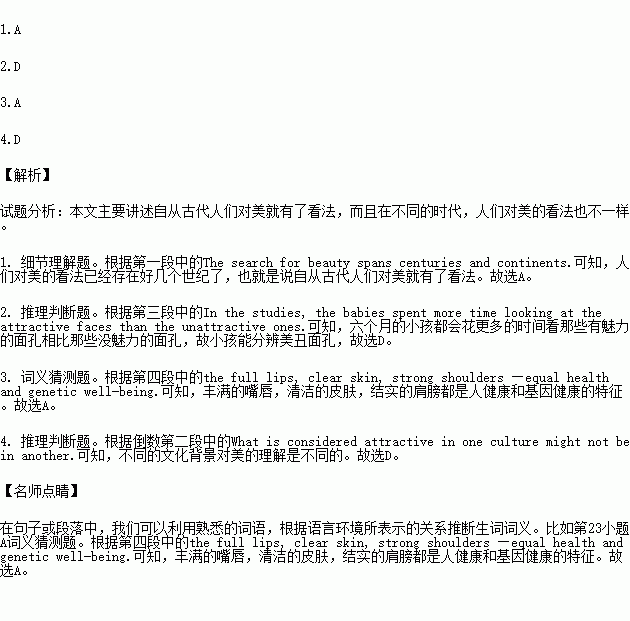题目内容
The Enigma (谜)of Beauty
The search for beauty spans centuries and continents. Paintings of Egyptians dating back over 4, 000 years show both men and women painting their nails and wearing makeup. In 18th-century France, wealthy noblemen wore large wigs (假发)of long, white hair to make themselves attractive. Today, people continue to devote a lot of time and money to their appearance.
There is at least one good reason for the desire to be attractive: beauty is power. Studies suggest that good-looking people make more money, get called on more often in class, and are regarded as friendlier.
But what exactly is beauty? It's difficult to describe it clearly, and yet we know it when we see it. And our awareness of it may start at a very early age. In one set of studies, six-month-old babies were shown a series of photographs. The faces on the pictures had been rated for attractiveness by a group of college students. In the studies, the babies spent more time looking at the attractive faces than the unattractive ones.
The idea that even babies can judge appearance makes perfect sense to many researchers. In studies by psychologists, men consistently showed a preference for women with larger eyes, fuller lips, and a smaller nose and chin while women prefer men with large shoulders and a narrow waist. According to scientists, the mind unconsciously tells men and women that these traits —the full lips, clear skin, strong shoulders —equal health and genetic well-being.
Not everyone thinks the same way, however. “Our hardwiredness can be changed by all sorts of expectations — mostly cultural,” says C. Loring Brace, an anthropologist at the University of Michigan. What is considered attractive in one culture might not be in another. Look at most Western fashion magazines: the women on the pages are thin. But is this “perfect” body type for women worldwide? Scientists' answer is no; what is considered beautiful is subjective and varies around the world. They found native peoples in southeast Peru preferred shapes regarded overweight in Western cultures.
For better or worse, beauty plays a role in our lives. But it is extremely difficult to describe exactly what makes one person attractive to another. Although there do seem to be certain physical traits considered universally appealing, it is also true that beauty does not always keep to a single, uniform standard. Beauty really is, as the saying goes, in the eye of the beholder.
1.People's ideas about beauty ________.
A. have existed since ancient times
B. can be easily described
C. have little influence on a person's success
D. are based upon strict standard
2.In Paragraph 3, the babies in the study ________.
A. were rated for their appearance
B. were entered in a beauty contest
C. were shown photos of a group of college students
D. were able to tell attractive faces from unattractive ones
3.The underlined word “traits” in Paragraph 4 probably means ________.
A. qualities B. measurements
C. judgments D. standards
4.We can learn from the passage that ________.
A. the ideas of beauty vary as people grow up
B. the search for beauty is rooted in lack of confidence
C. the standards for beauty are based on scientific researches
D. the understanding of beauty depends on cultural backgrounds

